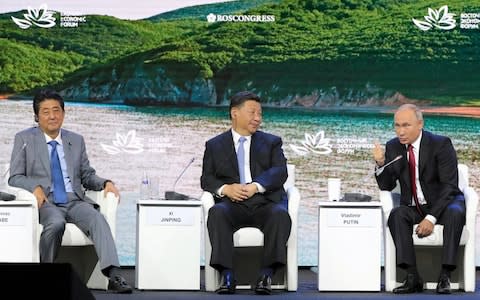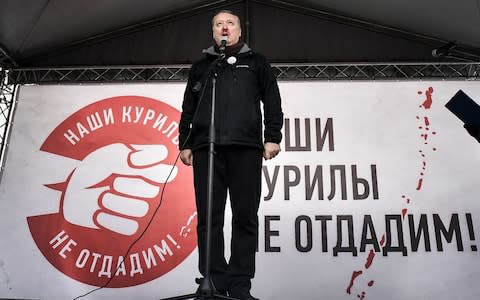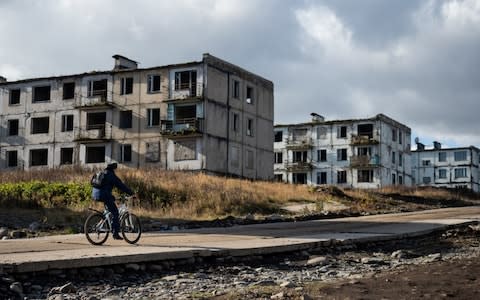Russians protest Putin and Abe's talks over returning Kuril Islands to Japan

Hundreds of Russians have protested talks over giving some of the Kuril Islands back to Japan ahead of a meeting between Shinzo Abe and Vladimir Putin.
Demonstrators chanted “the Kurils are our lands!” and “dismiss the government!” in a park in front of the Russian army theatre in downtown Moscow on Sunday, bundled up against the freezing temperatures. “We'll hand over Putin rather than the Kurils!” one placard read.
A similar rally took place in Khabarovsk in eastern Russia, and protesters have previously come out on Sakhalin Island.
Russia and Japan have been vying for control of the Kurils since the 18th century, but Moscow took complete control of the island chain at the end of the Second World War. Tokyo refused to recognise this claim, which has prevented the two countries from ever signing a peace treaty.
At a southeast Asia summit in November, Mr Putin and Mr Abe agreed to renew negotiations on the basis of a Soviet initiative to return two of the islands in exchange for a peace treaty. They will meet again in Moscow on Tuesday.
Mr Abe is considering asking for only two of the four major disputed islands, the Kyodo agency reported late Sunday.
But last week the foreign minister said Japan must first recognise Russia's sovereignty over the Kurils for any progress to be made, and Moscow has been gradually strengthening its military presence on the islands.

Mr Putin said in December “it's hard to make a decision” without understanding the limits of American military deployments to Japan, highlighting the Kremlin's fear of US troops appearing on the Kurils.
Surveys have shown that three-fourths of Russians oppose returning any of the islands. Mr Putin's ratings have already been falling amid an unpopular hike in the pension age, and a state poll last week found that only 33 per cent now trust him.
Vsevolod Chaplin, an influential priest and former spokesman for the Russian Orthodox Church, said at the protest told the protesters in Moscow, warned at the Moscow demonstration that the “people don't want to sell Russian lands”. The rally brought together both monarchist and communist groups.

“Russia has been retreating since the Cuban missile crisis,” Mr Chaplin told protesters. “(The annexation of) Crimea was a good counter-attack, but it's not enough.”
Another speaker, Igor Strelkov, the former commander of Russia-backed separatist forces in eastern Ukraine, told The Telegraph that the Kuril Islands were strategically and economically valuable, “but the symbolic meaning is much more important”.
“Great Britain, as a state that always saw the honour of the country and crown as a very important argument, if we remember the war for the Falkland Islands, should understand that a state which voluntarily and unnecessarily gives up part of its sovereign territory loses its honour,” he said. “It may even lose its right to exist.”

Political analyst and Marxist activist Boris Kagarlitsky argued that the talks were an attempt to ease Japan's sanctions over Crimea and open another destination for corrupt money.
Russia's wealthy “need a new channel to bring money to Japan and then to the West,” he said.
Mr Putin complained in October that Japan's sanctions do not foster mutual trust.
Nikolai Selekho, a jurist who was born in the far east, said his grandfather had fought against the Japanese in Manchuria and that Russians would never let the islands go.
“We lost territories in Kazakhstan and Ukraine,” he said. “We can't give up any more land. It is our father and mother.”

 Yahoo News
Yahoo News 
